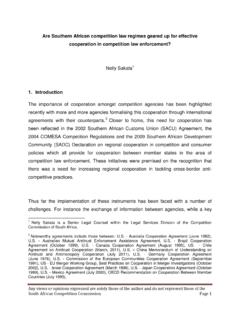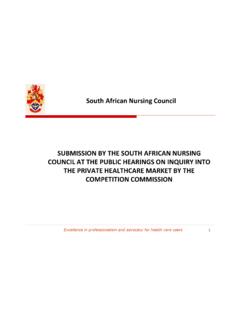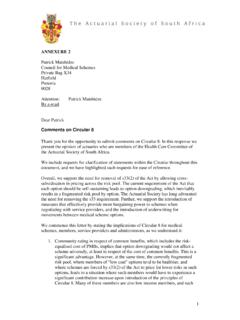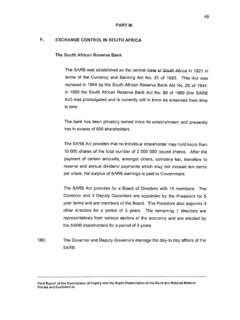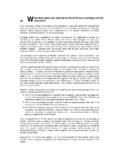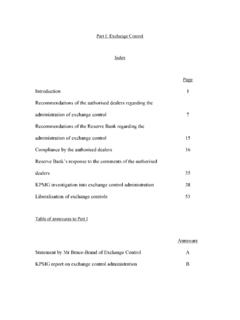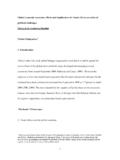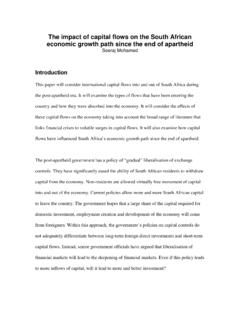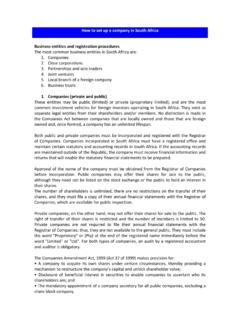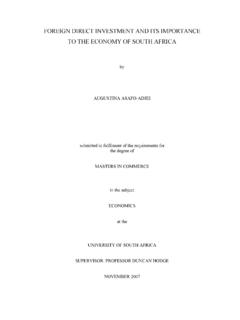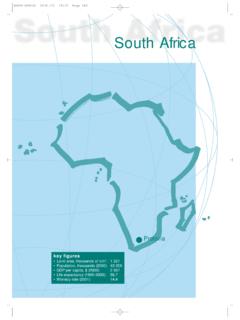Transcription of IS SOUTH AFRICA A GOOD INVESTMENT DESTINATION? A …
1 1 IS SOUTH AFRICA A good INVESTMENT DESTINATION? a relook AT CONDITIONS IN MERGER CASES Romeo Kariga*, Jabulani Ngobeni**1 and Mfundo Ngobese**2 1. Introduction The Competition Commission ( Commission ) and the Competition Tribunal ( Tribunal ) are empowered to impose conditions in merger cases to address competition concerns or public interest concerns that they identify. Of late the conditions imposed or recommended by the Commission have been vigorously challenged in the Tribunal. With the economic downturn of 2008, there has also been an increased focus on public interest concerns by the Commission and the Tribunal. This increased focus has given rise to a variety of conditions. One may argue that some of the conditions may not be in line with the role of the competition authorities in attaching conditions to their decisions.
2 Arguably, some merging parties may have had stricter conditions imposed on them than is necessary to address competition or public interest issues identified. Some of the conditions may not be merger specific. As seen in the recent Walmart/Massmart2 decisions, the conditions imposed in merger cases are sometimes used, rightly or wrongly, to measure the friendliness of SOUTH AFRICA as an INVESTMENT destination. With such great importance, merger conditions have to be imposed after careful analysis of the dynamics of a market while taking cognizance of the existing legal framework. This paper explores the ambit within which the competition authorities should operate in imposing conditions in merger cases. It also explores the possible impact of conditions imposed in mergers on investments in the country.
3 A comparison will be done with the European Commission s model of enabling the *Senior Legal Counsel, Competition Commission of SOUTH AFRICA . The views in this paper are those of the writer and are made in his personal capacity and do not reflect the views of the Competition Commission. ** Senior Legal Counsel, Competition Commission of SOUTH AFRICA . The views in this paper are those of the writer and are made in his personal capacity and do not reflect the views of the Competition Commission. **Senior Associate, Nortons Incorporated. The views expressed in this paper are those of the writer and are made in his personal capacity and do not reflect the views of Nortons Incorporated. 2 Walmart Stores Inc and Massmart Holdings Ltd CT Case NO: 73/LM/Dec10 ( Walmart/Massmart decision ) and The Minister of Economic Development and Others v The Competition Tribunal and Others CAC Case NO.
4 110/CAC/Jul11 and 111/CAC/Jun11 (the Walmart/Massmart CAC decision) 2 merging parties to suggest conditions which may be favourable in addressing some of the issues identified. 2. Investments that SOUTH AFRICA seeks In developing countries domestic spending usually accounts for the greater part of the total SOUTH AFRICA is no exception to that norm. In addition to government spending, foreign direct investments (FDIs) are also a very important form of INVESTMENT which will be considered in this paper. This paper shall not focus on portfolio inflows, investments that are made in shares on the JSE Securities Exchange and the bond market as they do not involve committed capital and can easily be taken away from the SOUTH AFRICA . 3. Government incentives and spending Most of the instruments that the government utilises to stimulate private sector growth in pursuit of specific targets such as lower levels unemployment tend to be indirect and generally involve government spending on private goods and services, on the one hand, or are aimed at creating favourable or stable conditions for INVESTMENT including foreign direct INVESTMENT (FDI), on the other.
5 In a free market economy the role of the state does not encompass prescribing to corporations how much resources to use, including human resources, and/or where to invest - more specifically to favour local production over imports. In response to the 2008/09/10 global economic crisis government pursued an expansionary fiscal policy by increasing public sector spending on infrastructure and social assistance. In 2010 consolidated gross government spending increased by per cent. Structural fiscal deficit expanded from per cent of gross domestic product (GDP) for the 2008/09 fiscal year to per cent of GDP for the 2010/11 fiscal year. This was mainly due to increases in social transfers, lending to SANRAL and Eskom and also as result of the burgeoning public salary. Unlike infrastructure or similar public works spending government spending on social security 3 UNCTAD World INVESTMENT Report 2011 accessed at )at p21.
6 For detailed discussion on FDI and domestic INVESTMENT , see UNCTAD, 2010a and 2011a 3 payments has even more indirect effect on unemployment levels. Being primarily a demand side stimulus which, unlike government supply side development programmes, seeks to put money in the pockets of individuals in the hope that they will spend it on locally manufactured goods and services and that once so spent the money will not just constitute more profits in the pockets of capital, but will be reinvested. While government spending itself directly impacts positively on employment in the form of creation of employment opportunities within the state or state enterprises that are recipients of government spending and in private companies involved in the provision of products or services to the state due to increase demand for inputs, in the private sector this does not necessarily translate to specific numbers in terms of employment nor does it have any promise of INVESTMENT in local production.
7 4. Foreign direct investments To achieve the targeted unemployment levels the government also looks up to foreign direct INVESTMENT to provide the necessary stimulus. In a country like SOUTH AFRICA , FDI brings a lot of benefits4 some of which have a positive impact on employment such as: Establishment of new production capacity or expansion of existing capacity; Skills transfer which alleviate the structural or skills mismatch causes of unemployment; and Improvement in production processes which increases competitiveness and demand of local products. Unlike government spending, particularly in social security, FDI is seen as involving guaranteed private sector INVESTMENT in the economy. As noted by Penelope Hawkins and Keith Lockwood5 FDI is associated with relatively longer term, committed capital, and with patient investors. 4 There are strong views that FDIs do not bring economic growth but follow it.
8 See Jason Kiat The effect of exchange rate and inflation on foreign direct INVESTMENT and its relationship with economic growth in SOUTH AFRICA 2008 at p7-8 accessed at 5 A Strategy for Attracting Foreign Direct INVESTMENT , A paper presented to the Economic Society of SOUTH AFRICA s biennal conference, Glenburn Lodge(13 September 2001) 4 While this is certainly true it should be noted that a large proportion of FDI takes the form of mergers and acquisitions instead of greenfields Taking over an existing business may not necessarily translate into more employment at least until the foreign investor sees an opportunity for growth. Investments made by car manufacturers are the ideal form of FDI that the government is looking for. The government s Automotive Production and Development Programme (APDP) previously called Motor Industry Development Programme (MIDP) is at the core of this success.
9 The programme provides incentives to local car and component manufacturers in the form of tariff breaks. This has resulted in a lot of greenfields entry into SOUTH African automotive and related components industry which has made a significant contribution to job creation. Moreover, the recent form of market-seeking FDI caused by the revived interest in AFRICA as a potential growth market could spark acquisition of existing local companies. This could, with a not so negligible lag, bring expansion in production as companies seek to supply neighbouring countries. The government will need to take heed of factors that influence these types of investors. 5. Factors affecting FDIs There are various ways in which the state actively tries to attract FDI and none of these involve direct interference in the commercial decisions of companies.
10 However, it is also important that the government should not lose sight of the fact that incentives are but one factor investors look at when deciding where to invest. Economic determinants should be expected to constitute primary considerations. These, as enumerated by Rashmi Banga7, include: Current market and potential market size; Costs of labour; 6 FDI is traditionally broken down into three components: equity capital, intra-company loans, and reinvested earnings of foreign affiliates (See UNCTAD World INVESTMENT Report 2011 on p12 accessed at ) 7 Impact of Government Policies and INVESTMENT Agreements on FDI Inflows, Working Paper N. 116, Indian Council for Research on International Economic Relations - November 2008 5 Availability of skilled labour; Cost of capital; Availability of infrastructure; Real exchange rate; Exchange rate stability; Rate of inflation; Financial health; and Overall Economic Stability that includes political stability.
